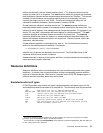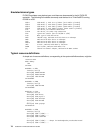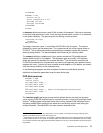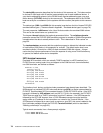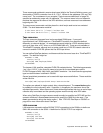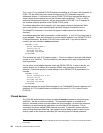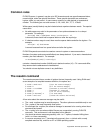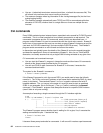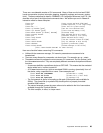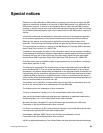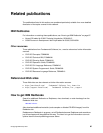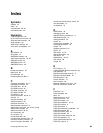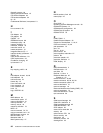Appendix B. FLEX-ES parameters 83
There are a considerable number of CLI commands. Many of them are for low-level S/390
hands-on operation (such as instruction stepping, inspecting registers and memory, and so
forth). These are described in detail in FSIMM210: CLI Language Reference, from FSI. We
describe only a few of the higher-level commands here. We assume you are in flexescli
interactive mode for these examples:
flexes> halt (stops current emulated S/390 CPUs)
flexes> go (resumes operation, if not single step)
flexes> hwc ..... (enter text for system console)
flexes> ipl devaddr [parm] (IPLs the first emulated CPU)
flexes> iplc devaddr [parm] (clears state and memory first)
flexes> mount devaddr [filename | OFFLINE] (discussed later)
flexes> notready devaddr (make emulated device not ready)
flexes> quit (terminate flexescli; also ‘exit’)
flexes> ready devaddr (makes emulated device ready)
flexes> restart (like the ‘restart’ button on S/390)
flexes> rewind devaddr (only for FakeTape or SCSI drives)
flexes> shutdown (gracefully terminates S/390)
flexes> unload devaddr (unloads FakeTape or SCSI drive)
(like a ‘mount devaddr OFFLINE’ for other devices)
Here are a few brief notes concerning CLI commands:
Unlike with the resources manager, CLI numeric parameters are assumed to be
hexadecimal.
There are many aliases for commands, not shown here. For example: go = g = start.
The mount command is perhaps the most common CLI command. Do not confuse it with
the Linux mount command. They are completely different commands that perform different
functions.
– A resources definition can define a device as OFFLINE. This means that the emulated
device exists but is, in effect, turned off.
– A CLI mount command can, while an emulated S/390 is running, dynamically “turn on”
the device, using a specified file or name. Some examples are:
flexes> mount A90 /s390/WORK01 (assume A90 is a 3390)
flexes> mount 710 altcons (assume 710 is a local 3270)
flexes> mount 560 /home/tape3 (a FakeTape file)
– The first example is similar to mounting a disk pack (if disk packs were available for
3390s). The named file (or symbolic link) should point to a properly formatted
emulated 3390 volume.
– The second example causes the name altcons to be added to the list of connections
available through the Terminal Solicitor.
– The third example, in effect, is a tape mount.



